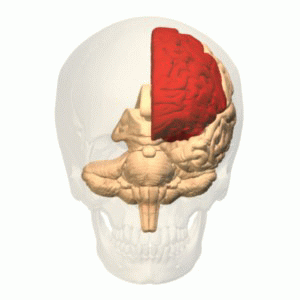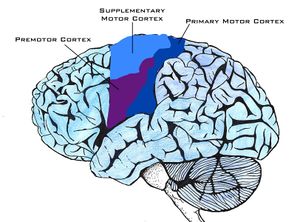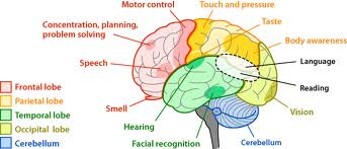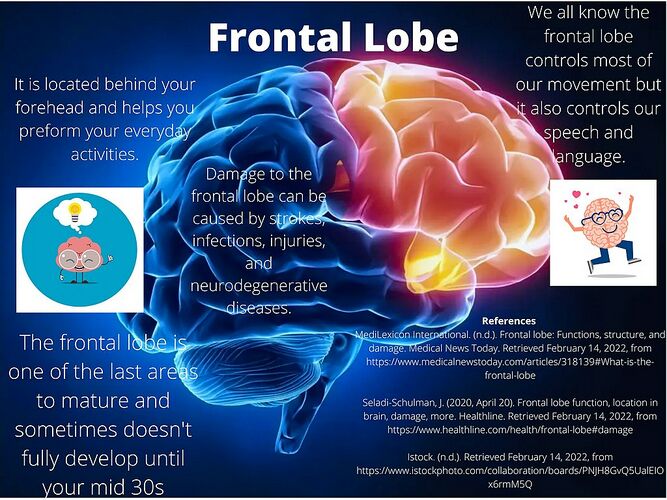Frontal Lobe Brain Injury: Difference between revisions
Wendy Walker (talk | contribs) No edit summary |
No edit summary |
||
| (41 intermediate revisions by 6 users not shown) | |||
| Line 1: | Line 1: | ||
<div class="editorbox"> | <div class="editorbox"> | ||
'''Original Editor '''- | '''Original Editor '''- [[User:User Name|Wendy Walker]] | ||
'''Lead Editors''' - {{Special:Contributors/{{FULLPAGENAME}}}} | '''Lead Editors''' - {{Special:Contributors/{{FULLPAGENAME}}}} | ||
| Line 6: | Line 6: | ||
== Introduction == | == Introduction == | ||
[[Image:Frontal lobe animation.gif|right|alt=]]The [[Frontal Lobe|frontal lobe]] is a relatively large lobe of the [[Brain Anatomy|brain]], extending from the front of the brain almost halfway towards the back of the brain. Damage to the frontal lobe of the brain can cause a range of symptoms, including motor weakness and behavioural problems. A variety of conditions can damage the frontal lobe, including [[stroke]], [[Traumatic Brain Injury|head trauma,]] and [[dementia]]<ref name=":0">Very well health [https://www.verywellhealth.com/the-brains-frontal-lobe-3146196 Frontal lobe injuries] Available from:https://www.verywellhealth.com/the-brains-frontal-lobe-3146196 (accessed 23.12.2020)</ref>. | |||
= | Symptoms of damage to the frontal lobe can vary because of the many functions carried out by the frontal lobes. Symptoms may include one or more of the following: | ||
* Weakness on one side of the body or one side of the face | |||
* [[Falls|Falling]] | |||
* Inability to solve problems or organize tasks | |||
* Reduced creativity | |||
* Impaired judgment | |||
* Reduced sense of taste or smell | |||
* [[Depression]] | |||
* Changes in behaviour | |||
* Low motivation | |||
* Low attention span, easily distracted1 | |||
* Reduced or increased sexual interest or peculiar sexual habits | |||
* Impulsive or risky behavior<ref name=":0" /> | |||
The | == Anatomy == | ||
In evolutionary terms, the frontal cortex has been the most recent brain area to evolve. These lobes integrate the other brain areas and are particularly responsible for higher level thinking and cognitive skills such as planning, evaluating likely outcomes, multitasking, performing risk assessment and the niceties of social interaction; it is the area of the brain that deals with abstract concepts. | |||
[[File:Motor Cortex Image.jpg|right|frameless]] | |||
The frontal lobes account for approximately one-third of human brain mass. They lie at the front of the brain, anterior to the parietal lobes and superior to the temporal lobe. Each frontal lobe (left and right) is generally considered to have several distinct divisions: | |||
[[ | *Motor cortex | ||
*[[Premotor Cortex|Premotor cortex]] | |||
*Supplementary motor cortex | |||
*Prefrontal cortex | |||
*Orbital cortex AKA frontal eye fields | |||
*Broca's Area | |||
== Vascular supply == | |||
* Medial frontal lobe: [[Anterior Cerebral Artery|anterior cerebral artery]] | |||
* Deep & lateral regions: superior division of [[Middle Cerebral Artery|middle cerebral artery]] | |||
== Function == | |||
[[File:The brain 2.jpg|right|frameless|347x347px]] | |||
The frontal lobe modifies and imposes constraints on reflexive behaviours<ref>Mesulam MM. [https://books.google.com/books?hl=en&lr=&id=ntOEPvcGoiYC&oi=fnd&pg=PA8&dq=Mesulam+MM.+DT+Stuss+and+RT+Knight.+The+Human+Frontal+Lobes:+Transcending+the+Default+Mode+through+Continent+Encoding.+Principles+of+Frontal+Lobe+Function.+Oxford:+2002.+8-30&ots=Vdcm4ZfvTb&sig=GNdabZUuNhEq1UoH_nuIml0RHwg The human frontal lobes: Transcending the default mode through contingent encoding]. Principles of frontal lobe function. 2002 Jun 27;54:8-30.</ref> and this control develops as the infant brain grows<ref>Luciana, ed. by Charles A. Nelson. Handbook of developmental cognitive neuroscience. Monica (2001). Cambridge, Mass. [u.a.]: MIT Press.</ref> and the frontal lobes become larger and more active. | |||
*Motor cortex: voluntary movement | |||
*Premotor cortex: storage of motor programs, sensorimotor integration, facilitation of controlled, smooth movements | |||
*Prefrontal cortex: ability to concentrate; inhibition of reflexive behaviours; personality & emotional traits; abstract thinking. Working memory, executive functions including the ability to plan & implement (& monitor/evaluate) a series of goal-directed actions. | |||
*Broca's Area: Motor control of speech | |||
*Supplementary Motor Cortex''':''' Intentional preparation for movement, procedural memory | |||
*Frontal Eye Fields''':''' Control of voluntary scanning movements of the eye | |||
== Causes of Damage == | |||
* [[Traumatic Brain Injury|head injury]] (It has been found that in traumatic brain injury contusions typically occur on the poles and the inferior aspects of the frontal lobes<ref>Flint AC, Manley GT, Gean AD, Hemphill III JC, Rosenthal G. [https://www.liebertpub.com/doi/abs/10.1089/neu.2007.0442 Post-operative expansion of hemorrhagic contusions after unilateral decompressive hemicraniectomy in severe traumatic brain injury.] Journal of neurotrauma. 2008 May 1;25(5):503-12.</ref>.) | |||
* [[stroke]] | |||
* [[Infectious Disease|infection]] that affects the frontal lobe | |||
* tumors in the frontal lobe | |||
* [[Multiple Sclerosis (MS)|multiple sclerosis]] | |||
* [[Neurodegenerative Disease|neurodegenerative diseases]] eg [[Alzheimer's Disease|Alzheimer’s disease]], [[Parkinson's|Parkinson’s disease]], [[Huntington Disease|Huntington’s disease]] | |||
[[File:Frontal Lobe injury.jpeg|center|thumb|667x667px]] | |||
== | == Treatment and Rehabilitation == | ||
Treatment for damage to the frontal lobe depends on the cause. Frontal lobe damage treatment plans include a team of several types of healthcare professionals. | |||
Some examples of potential treatments for frontal lobe damage include: | |||
* Physical therapy to help maintain or regain mobility, strength, and flexibility. | |||
* Occupational therapy to help learn new strategies to perform daily tasks and activities eg getting dressed, eating, or bathing. | |||
* Vocational counseling. | |||
* Speech-language therapy to aid in improving communication or teaching how to use assistive devices. | |||
* Cognitive therapy, working on skills like planning, judgment, and memory. | |||
* Psychological therapy to help improve relationships, emotional responses, and coping skills. | |||
* Surgery may be recommended in cases when an injury or brain tumor is causing damage. | |||
* In some cases, the cause of the frontal lobe damage may be permanent. eg neurodegenerative diseases. In these cases, treatment may also involve medications<ref>Healthline Frontal lobe damage Available from:https://www.healthline.com/health/frontal-lobe#causes (accessed 23.12.2020)</ref>. | |||
== | == 3 Frontal Lobe Syndromes == | ||
# Orbitofrontal syndrome - Lack of Inhibition. Patient demonstrates disinhibited, impulsive behaviour; difficulty in controlling their emotions; difficulty in maintaining concentration; lacking in judgement; failure to appreciate/anticipate consequences of their actions; can show euphoria, hypomania or grandiosity. Can also lead to abnormal sexual behaviour. | |||
# Frontal convexity syndrome - Apathetic. Patient shows disinterest and is apathetic; slowing of motor functions; unable to plan ahead; lacks motivation; lacks concern about the world around them. | |||
# Medial frontal syndrome - Akinetic. Reduced movement; loss of sensation in lower limbs; urinary incontinence; occasional mutism; profound apathy; sometimes show indifference to thirst or hunger | |||
== References == | == References == | ||
<references /> | <references /> | ||
[[Category:Head - Conditions]] | |||
[[Category:Acquired Brain Injuries]] | |||
Latest revision as of 15:54, 17 January 2023
Original Editor - Wendy Walker
Lead Editors - Wendy Walker, Lucinda hampton, Aminat Abolade, Kim Jackson, WikiSysop and Claire Knott
Introduction[edit | edit source]
The frontal lobe is a relatively large lobe of the brain, extending from the front of the brain almost halfway towards the back of the brain. Damage to the frontal lobe of the brain can cause a range of symptoms, including motor weakness and behavioural problems. A variety of conditions can damage the frontal lobe, including stroke, head trauma, and dementia[1].
Symptoms of damage to the frontal lobe can vary because of the many functions carried out by the frontal lobes. Symptoms may include one or more of the following:
- Weakness on one side of the body or one side of the face
- Falling
- Inability to solve problems or organize tasks
- Reduced creativity
- Impaired judgment
- Reduced sense of taste or smell
- Depression
- Changes in behaviour
- Low motivation
- Low attention span, easily distracted1
- Reduced or increased sexual interest or peculiar sexual habits
- Impulsive or risky behavior[1]
Anatomy[edit | edit source]
In evolutionary terms, the frontal cortex has been the most recent brain area to evolve. These lobes integrate the other brain areas and are particularly responsible for higher level thinking and cognitive skills such as planning, evaluating likely outcomes, multitasking, performing risk assessment and the niceties of social interaction; it is the area of the brain that deals with abstract concepts.
The frontal lobes account for approximately one-third of human brain mass. They lie at the front of the brain, anterior to the parietal lobes and superior to the temporal lobe. Each frontal lobe (left and right) is generally considered to have several distinct divisions:
- Motor cortex
- Premotor cortex
- Supplementary motor cortex
- Prefrontal cortex
- Orbital cortex AKA frontal eye fields
- Broca's Area
Vascular supply[edit | edit source]
- Medial frontal lobe: anterior cerebral artery
- Deep & lateral regions: superior division of middle cerebral artery
Function[edit | edit source]
The frontal lobe modifies and imposes constraints on reflexive behaviours[2] and this control develops as the infant brain grows[3] and the frontal lobes become larger and more active.
- Motor cortex: voluntary movement
- Premotor cortex: storage of motor programs, sensorimotor integration, facilitation of controlled, smooth movements
- Prefrontal cortex: ability to concentrate; inhibition of reflexive behaviours; personality & emotional traits; abstract thinking. Working memory, executive functions including the ability to plan & implement (& monitor/evaluate) a series of goal-directed actions.
- Broca's Area: Motor control of speech
- Supplementary Motor Cortex: Intentional preparation for movement, procedural memory
- Frontal Eye Fields: Control of voluntary scanning movements of the eye
Causes of Damage[edit | edit source]
- head injury (It has been found that in traumatic brain injury contusions typically occur on the poles and the inferior aspects of the frontal lobes[4].)
- stroke
- infection that affects the frontal lobe
- tumors in the frontal lobe
- multiple sclerosis
- neurodegenerative diseases eg Alzheimer’s disease, Parkinson’s disease, Huntington’s disease
Treatment and Rehabilitation[edit | edit source]
Treatment for damage to the frontal lobe depends on the cause. Frontal lobe damage treatment plans include a team of several types of healthcare professionals.
Some examples of potential treatments for frontal lobe damage include:
- Physical therapy to help maintain or regain mobility, strength, and flexibility.
- Occupational therapy to help learn new strategies to perform daily tasks and activities eg getting dressed, eating, or bathing.
- Vocational counseling.
- Speech-language therapy to aid in improving communication or teaching how to use assistive devices.
- Cognitive therapy, working on skills like planning, judgment, and memory.
- Psychological therapy to help improve relationships, emotional responses, and coping skills.
- Surgery may be recommended in cases when an injury or brain tumor is causing damage.
- In some cases, the cause of the frontal lobe damage may be permanent. eg neurodegenerative diseases. In these cases, treatment may also involve medications[5].
3 Frontal Lobe Syndromes[edit | edit source]
- Orbitofrontal syndrome - Lack of Inhibition. Patient demonstrates disinhibited, impulsive behaviour; difficulty in controlling their emotions; difficulty in maintaining concentration; lacking in judgement; failure to appreciate/anticipate consequences of their actions; can show euphoria, hypomania or grandiosity. Can also lead to abnormal sexual behaviour.
- Frontal convexity syndrome - Apathetic. Patient shows disinterest and is apathetic; slowing of motor functions; unable to plan ahead; lacks motivation; lacks concern about the world around them.
- Medial frontal syndrome - Akinetic. Reduced movement; loss of sensation in lower limbs; urinary incontinence; occasional mutism; profound apathy; sometimes show indifference to thirst or hunger
References[edit | edit source]
- ↑ 1.0 1.1 Very well health Frontal lobe injuries Available from:https://www.verywellhealth.com/the-brains-frontal-lobe-3146196 (accessed 23.12.2020)
- ↑ Mesulam MM. The human frontal lobes: Transcending the default mode through contingent encoding. Principles of frontal lobe function. 2002 Jun 27;54:8-30.
- ↑ Luciana, ed. by Charles A. Nelson. Handbook of developmental cognitive neuroscience. Monica (2001). Cambridge, Mass. [u.a.]: MIT Press.
- ↑ Flint AC, Manley GT, Gean AD, Hemphill III JC, Rosenthal G. Post-operative expansion of hemorrhagic contusions after unilateral decompressive hemicraniectomy in severe traumatic brain injury. Journal of neurotrauma. 2008 May 1;25(5):503-12.
- ↑ Healthline Frontal lobe damage Available from:https://www.healthline.com/health/frontal-lobe#causes (accessed 23.12.2020)










